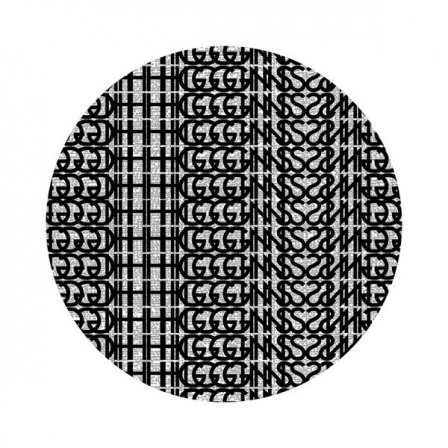In Patrick Higgins’s world, repetition is everything. As the incumbent guitarist with Brooklyn’s almighty ZS, Higgins has explored the ramifications of playing the same damn thing again and again, and now he’s doing the same yet again via his latest as a composer and solo artist. Of course, Social Death Mixtape doesn’t simply fixate itself on repetition for the sake of repetition; it explores what recurrence and reiteration mean on wider musical, psychological, and social levels. It remixes nine formerly unreleased compositions from the Higgins vault, running the whole gamut from wrenched string contortions to webbed guitar matrices, and in the end, it affirms that the seemingly innocuous phenomenon of repetition is the foundation of everything from rationality to civilization.
Lofty claims indeed, but even a passing familiarity with ZS’s most recent opus, Xe, is enough to know that central to Higgins’s work is a concern for mechanical repetition, how human societies are inherently based on such repetition, and the ways in which inflexible dogmatism ironically makes repetition unstable. This concern shines through opener “Pattern Select,” in which a harpsichord of dubious naturalness cycles manically through a small clutch of arpeggios. Here, the digitized chords initially appear to beat to a perfect 4/4 rhythm, yet closer listening reveals numerous subtle jumps forward that inflect the proceedings with various odd time signatures. All of these jolts and twitches eventually have the effect of unsettling the listener at precisely the moment he or she expects to be most settled by the ostensible regularity of piece, and in the process, they indirectly declare that, latent within all manifestations of order, is a substrate of underlying disorder.
This conception is key to Social Death Mixtape and its forays into avant-noise-classical-electronics. In “Curves, Points, Lines - No. 3,” tightened yet unhinged flurries of strings proffer the argument that within rationality hides irrationality, and vice versa. On the one hand, the sheer duration and scale of the track’s loose restatements of violin imply the mindless absurdity of adhering to the same forms and strictures in the face of a ceaselessly fluxing world. On the other, these loose restatements and their neurotic mumblings impose the sense that they were never entirely rational to begin with, that their apparent conformity and universality were formal abstractions intended to obscure the deviations and particularities they possessed beneath their facades.
Furthermore, the album’s mere title, as well as the fact that Higgins has been unmoored from his bandmates in ZS, ultimately lead towards the claim that the individual’s rationality is always a function of society and socialization. In other words, Higgins has committed “Social Death” in preparation for this album. He’s detached himself from his peers and friends, and as a consequence, his freeform, illogical compositions articulate a liberation from the constraints these others inflict on him, be it the compulsion to write material they can play along with or the more general compulsion to cohere with their norms and ends, that is, to be “rational.” Accordingly, he produces an experiment like “Nightwalker Deerstalker,” where discordant piano clusters multiply and spiral in a fit of abandon, testifying to what happens to the rational animal as soon as he stops being a social one.
It also becomes evident that the unreason and erraticism of Social Death Mixtape is part of his strategy to escape the damaging consequences a rationality defined by repetitiveness can have on the individual. In “The Language of Flowers,” his coiled, chiming guitar maps a winding path through the potential quagmires of order and discipline, through the tendency to hold fast to rules and regulations simply because they are enforced, simply because we might be punished for not doing so. Its rapid pirouettes sway and flutter in the proverbial breeze like the flora the song represents, more attuned to the vagaries of the external world than the blind dogma of nation states and a bureaucratizing globe.
At certain points, Higgins’s resistance to such dogma assumes epic proportions, or rather anti-epic proportions. “Erotic Apocalypse” is a blender of electronic swirls and amoral static that refuses all purpose and teleology, as if the assumption of a goal would only play into the hands of “the 1%” and serve to perpetuate their dominance. It’s an intimidating maelstrom of noise and hush, with buzzing clouds of digitization being pushed aside by watery slops of e-bubbling. As it flits and drifts from one island of sampled abrasion to another, it abstractly evokes the descent into carnal oblivion its title introduces, and eventually succeeds in consummating Higgins’s flight from the perils of excessive control and replication.
Not that the rest of Social Death Mixtape doesn’t succeed in this endeavor. Even when it confronts us with intricate latticeworks of harpsichord, guitar, or violin, it deconstructs itself from within, arguing that even the most meticulously arranged musical pieces are never as perfect as their flawless scores would suggest. By extension, Higgins’s masterful brand of “de-composition” also entails the imperfection of codified rationality, the inability of us flawed humans to ever perfectly realize the guidelines, conventions, laws, and protocols comprising that great edifice known as “Logos.” It has the irresistible power to remind us that we’re not as rational as we might like to think, since “rationality” is an idealization. However, its quicksilver dynamism also reminds us that we wouldn’t want to be perfectly rational anyway, since the alternative it and Higgins provide is far more interesting than doctrinaire repetition ever could be.
More about: Patrick Higgins, ZS




